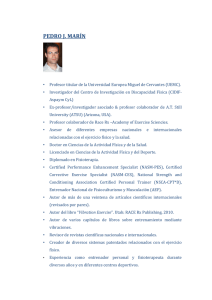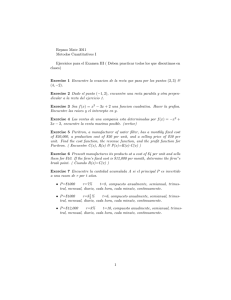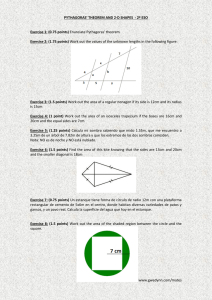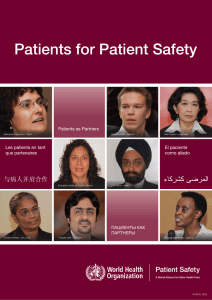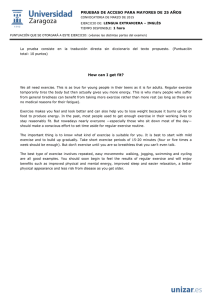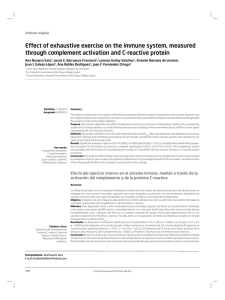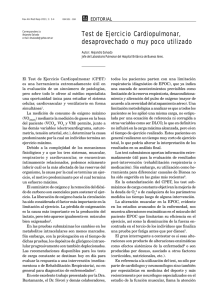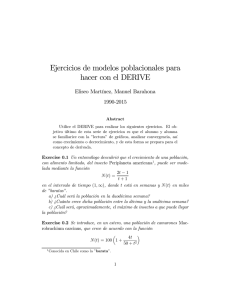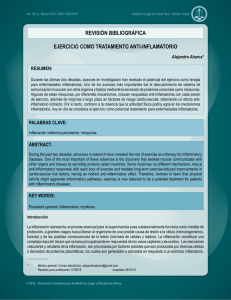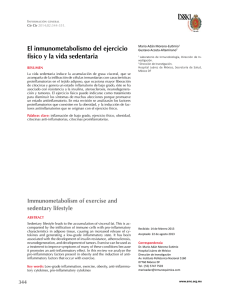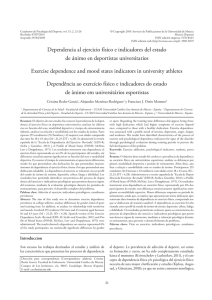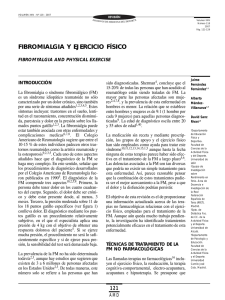Abstract - Archivos de Medicina del Deporte
Anuncio
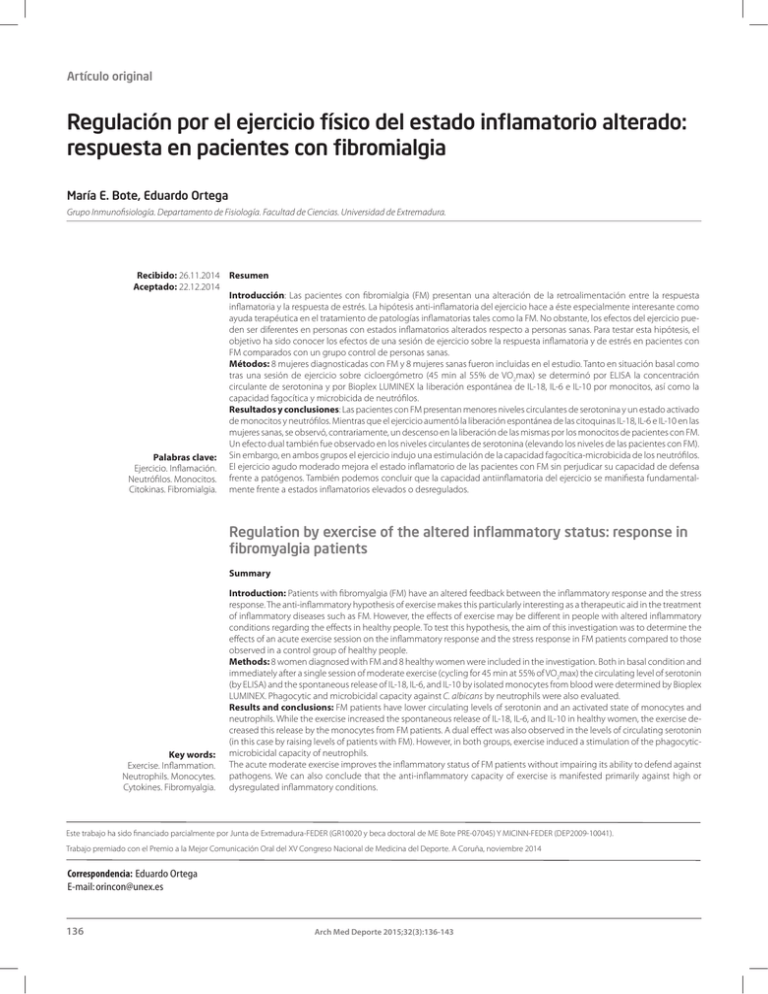
Artículo original Regulación por el ejercicio físico del estado inflamatorio alterado: respuesta en pacientes con fibromialgia María E. Bote, Eduardo Ortega Grupo Inmunofisiología. Departamento de Fisiología. Facultad de Ciencias. Universidad de Extremadura. Recibido: 26.11.2014 Resumen Aceptado: 22.12.2014 Introducción: Las pacientes con fibromialgia (FM) presentan una alteración de la retroalimentación entre la respuesta inflamatoria y la respuesta de estrés. La hipótesis anti-inflamatoria del ejercicio hace a éste especialmente interesante como ayuda terapéutica en el tratamiento de patologías inflamatorias tales como la FM. No obstante, los efectos del ejercicio pueden ser diferentes en personas con estados inflamatorios alterados respecto a personas sanas. Para testar esta hipótesis, el objetivo ha sido conocer los efectos de una sesión de ejercicio sobre la respuesta inflamatoria y de estrés en pacientes con FM comparados con un grupo control de personas sanas. Métodos: 8 mujeres diagnosticadas con FM y 8 mujeres sanas fueron incluidas en el estudio. Tanto en situación basal como tras una sesión de ejercicio sobre cicloergómetro (45 min al 55% de VO2max) se determinó por ELISA la concentración circulante de serotonina y por Bioplex LUMINEX la liberación espontánea de IL-18, IL-6 e IL-10 por monocitos, así como la capacidad fagocítica y microbicida de neutrófilos. Resultados y conclusiones: Las pacientes con FM presentan menores niveles circulantes de serotonina y un estado activado de monocitos y neutrófilos. Mientras que el ejercicio aumentó la liberación espontánea de las citoquinas IL-18, IL-6 e IL-10 en las mujeres sanas, se observó, contrariamente, un descenso en la liberación de las mismas por los monocitos de pacientes con FM. Un efecto dual también fue observado en los niveles circulantes de serotonina (elevando los niveles de las pacientes con FM). Palabras clave: Sin embargo, en ambos grupos el ejercicio indujo una estimulación de la capacidad fagocítica-microbicida de los neutrófilos. Ejercicio. Inflamación. El ejercicio agudo moderado mejora el estado inflamatorio de las pacientes con FM sin perjudicar su capacidad de defensa Neutrófilos. Monocitos. frente a patógenos. También podemos concluir que la capacidad antiinflamatoria del ejercicio se manifiesta fundamentalCitokinas. Fibromialgia. mente frente a estados inflamatorios elevados o desregulados. Regulation by exercise of the altered inflammatory status: response in fibromyalgia patients Summary Key words: Exercise. Inflammation. Neutrophils. Monocytes. Cytokines. Fibromyalgia. Introduction: Patients with fibromyalgia (FM) have an altered feedback between the inflammatory response and the stress response. The anti-inflammatory hypothesis of exercise makes this particularly interesting as a therapeutic aid in the treatment of inflammatory diseases such as FM. However, the effects of exercise may be different in people with altered inflammatory conditions regarding the effects in healthy people. To test this hypothesis, the aim of this investigation was to determine the effects of an acute exercise session on the inflammatory response and the stress response in FM patients compared to those observed in a control group of healthy people. Methods: 8 women diagnosed with FM and 8 healthy women were included in the investigation. Both in basal condition and immediately after a single session of moderate exercise (cycling for 45 min at 55% of VO2max) the circulating level of serotonin (by ELISA) and the spontaneous release of IL-18, IL-6, and IL-10 by isolated monocytes from blood were determined by Bioplex LUMINEX. Phagocytic and microbicidal capacity against C. albicans by neutrophils were also evaluated. Results and conclusions: FM patients have lower circulating levels of serotonin and an activated state of monocytes and neutrophils. While the exercise increased the spontaneous release of IL-18, IL-6, and IL-10 in healthy women, the exercise decreased this release by the monocytes from FM patients. A dual effect was also observed in the levels of circulating serotonin (in this case by raising levels of patients with FM). However, in both groups, exercise induced a stimulation of the phagocyticmicrobicidal capacity of neutrophils. The acute moderate exercise improves the inflammatory status of FM patients without impairing its ability to defend against pathogens. We can also conclude that the anti-inflammatory capacity of exercise is manifested primarily against high or dysregulated inflammatory conditions. Este trabajo ha sido financiado parcialmente por Junta de Extremadura-FEDER (GR10020 y beca doctoral de ME Bote PRE-07045) Y MICINN-FEDER (DEP2009-10041). Trabajo premiado con el Premio a la Mejor Comunicación Oral del XV Congreso Nacional de Medicina del Deporte. A Coruña, noviembre 2014 Correspondencia: Eduardo Ortega E-mail: [email protected] 136 Arch Med Deporte 2015;32(3):136-143
